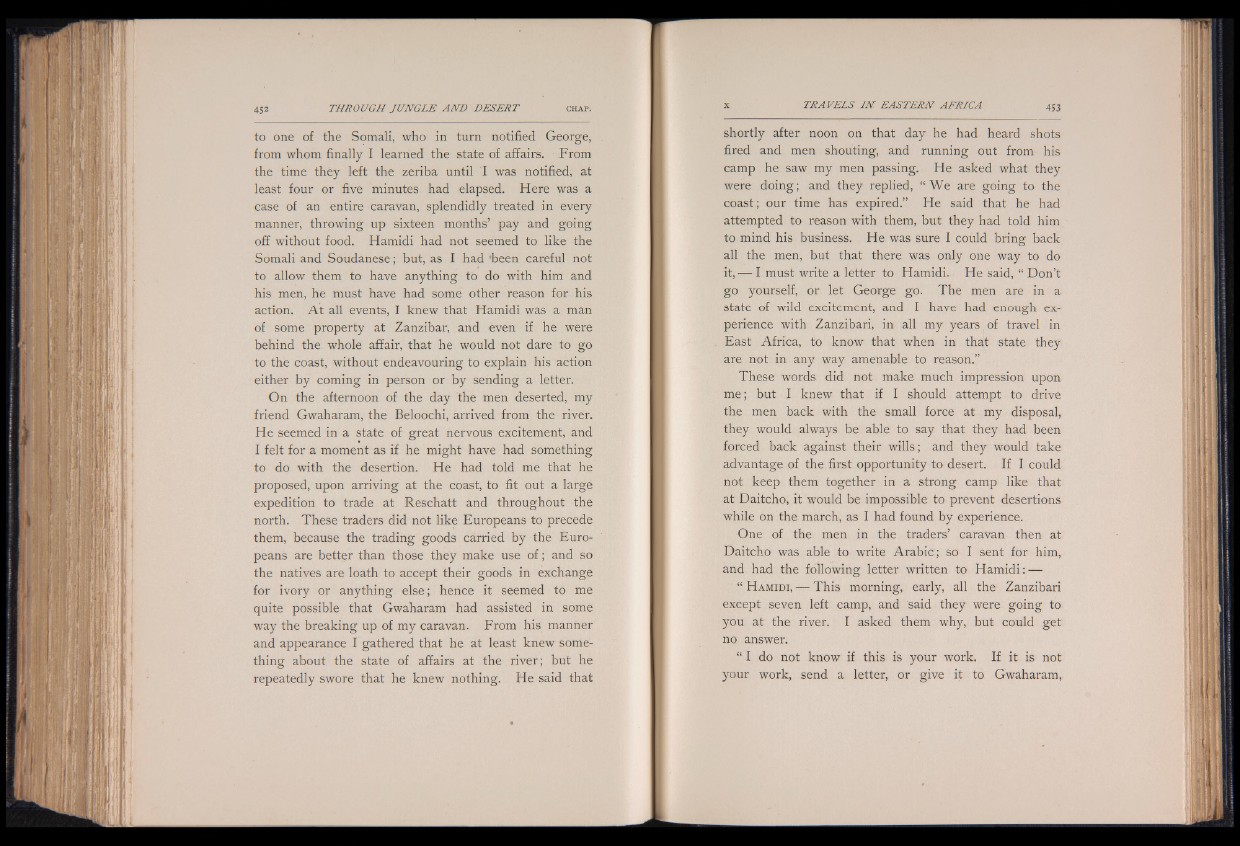
to one of the Somali, who in turn notified George,
from whom finally I learned the state of affairs. From
the time they left the zeriba until I was notified, at
least four or five minutes had elapsed. Here was a
case of an entire caravan, splendidly treated in every
manner, throwing up sixteen months’ pay and going
off without food. Hamidi had not seemed to like the
Somali and Soudanese; but, as I had 'been careful not
to allow them to have anything to do with him and
his men, he must have had some other reason for his
action. A t all events, I knew that Hamidi was a man
of some property at Zanzibar, and even if he were
behind the whole affair, that he would not dare to go
to the coast, without endeavouring to explain his action
either by coming in person or by sending a letter.
On the afternoon of the day the men deserted, my
friend Gwaharam, the Beloochi, arrived from the river.
He seemed in a state of great nervous excitement, and
I felt for a moment as if he might have had something
to do with the desertion. He had told me that he
proposed, upon arriving at the coast, to fit out a large
expedition to trade at Reschatt and throughout the
north. These traders did not like Europeans to precede
them, because the trading goods carried by the Europeans
are better than those they make use o f ; and so
the natives are loath to accept their goods in exchange
for ivory or anything else; hence it seemed to me
quite possible that Gwaharam had assisted in some
way the breaking up of my caravan. From his manner
and appearance I gathered that he at least knew something
about the state of affairs at the river; but he
repeatedly swore that he knew nothing. He said that
shortly after noon on that day he had heard shots
fired and men shouting, and running out from his
camp he saw my men passing. He asked what they
were doing; and they replied, “ We are going to the
coast; our time has expired.” He said that he had
attempted to reason with them, but they had told him
to mind his business. He was sure I could bring back
all the men, but that there was only one way to do
it,— I must write a letter to Hamidi. He said, “ Don’t
go yourself, or let George go. The men are in a
state of wild excitement, and I have had enough experience
with Zanzibari, in all my years of travel in
East Africa, to know that when in that state they
are not in any way amenable to reason.”
These words did not make much impression upon
me; but I knew that if I should attempt to drive
the men back with the small force at my disposal,
they would always be able to say that they had been
forced back against their wills; and they would take
advantage of the. first opportunity to desert. If I could
not keep them together in a strong camp like that
at Daitcho, it would be impossible to prevent desertions
while on the march, as I had found by experience.
One of the men in the traders’ caravan then at
Daitcho was able to write Arabic; so I sent for him,
and had the following letter written to Hamidi: —
“ Hamidi, — This morning, early, all the Zanzibari
except seven left camp, and said they were going to
you at the river. I asked them why, but could get
no answer.
“ I do not know if this is your work. If it is not
your work, send a letter, or give it to Gwaharam,